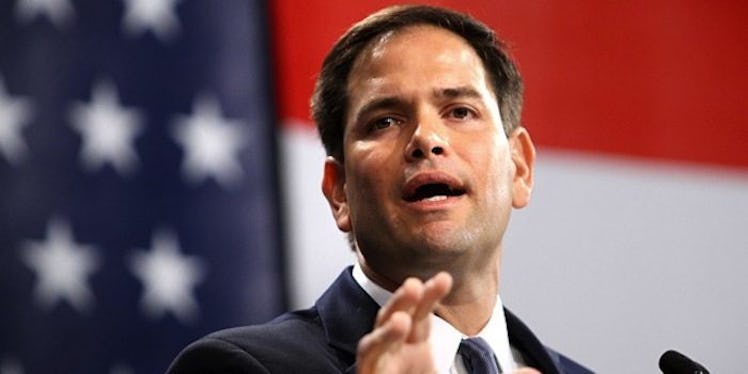
Why GOP Candidates Are Invisible To Gen-Y In The 2016 Election
A CNN and ORC International poll released last month revealed a chilling, yet not entirely unexpected, fact: Young Americans don't recognize the Republican candidates for president nearly as much as their Democratic challengers, like, say, Hillary Clinton.
Twenty-seven percent of Americans ages 18 to 34 have never heard of former Florida Gov. Jeb Bush. Forty-five percent don't recognize Kentucky Sen. Rand Paul. Sixty percent don't recognize Wisconsin Gov. Scott Walker.
The same or worse is true of the rest of the Republican field.
In deep contrast, Hillary Clinton is a name all Millennials have heard of, which means the former Secretary of State and now-official Democratic candidate for president already has a leg up on her Republican challengers, purely because of her recognizability.
So, the larger question is, why are Millennials more likely — much more likely — to know Clinton than each and every member of the GOP field running in 2016?
First off, the Republican candidates comprise a largely young group, meaning they haven't been around long enough to stick in Millennials' minds as 67-year-old Clinton does. But, this is ironic because Millennials, as do all voters, want a president to represent them.
A young candidate, then, would offer a perspective an older one wouldn't.
Bush, 62, is really the only Republican candidate who comes close to Clinton's age, and there are many youthful senators — such as Paul, 52, and Marco Rubio, 43 — who offer a fresh perspective ahead of the 2016 race.
And, speaking of numbers, it's not only their age that makes the group unrecognizable.
The sheer amount of GOP contenders also makes it difficult for voters to keep track of them.
Democrats and liberal media outlets have been exclusively shouting, "Ready for Hillary," for months now -- some even since the former Secretary of State lost the party's nomination in 2008 to Barack Obama — but it's nearly impossible to sufficiently lend attention to all of the GOP candidates who have expressed interest in running in 2016.
There's Bush, Rubio, Walker, Paul, Cruz, Graham, Perry, Huckabee, Christie, Santorum, Kasich, Fiorina, Carson and even Trump.
The GOP field has become so big, Millennials don't have a particular candidate to latch onto when they think, "Republican nomination." Clinton, on the other hand, is already the Democrats' chosen one.
Liberals are praising her for her strategically down-to-earth campaign rollout, while Republicans are attacking her from every angle possible.
Clinton is everywhere.
In fact, it seems since her official campaign announcement, Clinton has maintained a monopoly over the mainstream media as reporters cover her pitstop to Chipotle and pursue her "Scooby" bus as it travels across the country.
She nearly eclipsed Marco Rubio's presidential announcement, which came only a day after her own.
Mainstream media largely leans liberal, meaning outlets cover individuals like Hillary Clinton more frequently, as well as in a more favorable light. When they do depict a Republican candidate, he or she is more likely than Clinton to be criticized or approached from a point of attack.
Fox News, of course, is an exception here, but the channel's viewership is largely comprised of individuals aged 60 and over. It is also consistently losing the Millennial audience, meaning young Americans won't be tuning in to experience the alternative perspective.
And, when Republican lawmakers are covered in the liberal media — or on comedy programs like "The Daily Show" that are governed by liberal Hollywood and frequented by young Americans — they are often covered exclusively for their controversial stances on issues, such as gay marriage and climate change, to name a few.
That coverage is almost never supplemented by equally negative portraits of Democrats and is typically oversimplified.
The problem is Millennials don't get the full picture.
They see Bush and Rubio as individuals who won't support gay marriage. They don't view them as candidates who believe the issue of gay marriage should be an issue for states and not the federal government to decide, which is quite a logical approach to the issue when unpacked.
Young Americans also then have to look for the stances taken by Republicans on other, perhaps, less controversial issues; whereas, those of liberals are thrown in their faces. They don't as readily know how Graham approaches foreign policy, or how Paul feels about government surveillance.
Millennials pretty much only see what liberals deem as "bad."
It's up to young Americans to seek out their candidates and not merely accept the positive portrait of Clinton conveyed by liberal media outlets.
The fact such substantial amounts of Millennials don't know their Republican candidates ahead of 2016 indicates young Americans have more to learn before they cast their ballots.
So, I challenge Millennials: Look at your options. Don't resign yourselves to the simplified picture propagated by the mainstream media.
And, after you look, if all is said and done and you still want to vote for Clinton, then do so. But, don't blindly cast your endorsement for her because of what mainstream media tells you.
Dive deeper into each contender, beyond the political attack ads and "Saturday Night Live" segments.